US Says Additional Nuclear Talks In Brussels Not Necessary
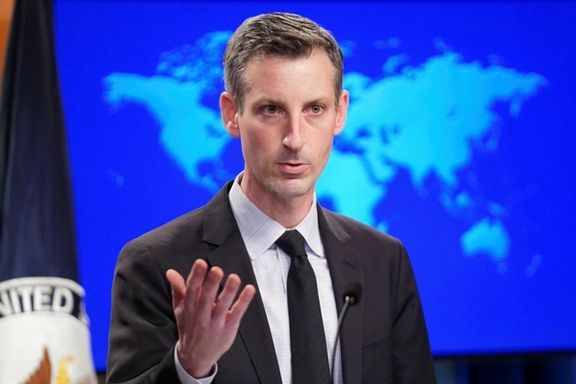
Talks in Brussels are not necessary before the resumption of indirect nuclear talks with Iran in Vienna, State Department spokesperson Ned Price said Monday.

Talks in Brussels are not necessary before the resumption of indirect nuclear talks with Iran in Vienna, State Department spokesperson Ned Price said Monday.
Reference to possible talks in Brussels with the EU emerged after the visit of European Union's chief negotiator Enrique Mora to Tehran on October 14.
Reports in Iranian media on Sunday suggested a possible meeting in Brussels, but the European Union's foreign policy chief Josep Borrell played down the chance of any talks outside of Vienna earlier on Monday.
Iran has said it wants to review documents from the first six rounds of talks with EU in Brussels, but that would not be different from negotiations and would effectively leave Washington out of the process for an agreement to revive the Joint Comprehensive Plan of Actions, JCPOA.
Iran has been refusing to return to the Vienna talks that began in April and were suspended in June when Tehran said its new president needed time to form a government. In the meantime, Iran continues to enrich uranium up to 60 percent, getting closer to having enough fissile material for a bomb.
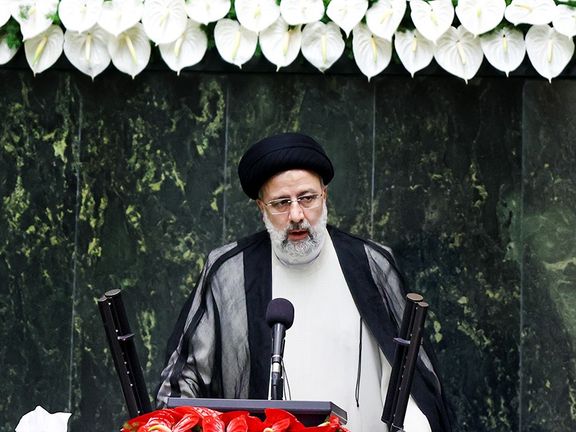
Iran's hardline President Ebrahim Raisi said on Monday that the US should lift sanctions, as Tehran has refused to return to nuclear talks since in June.
"We are serious about result-oriented negotiations. ... If Americans are serious, they should remove unjust sanctions on Iran," Raisi told state TV.
In April, Iran and six powers started talks to reinstate the deal that then-US President Donald Trump ditched three years ago and reimposed sanctions that have squeezed Iran's oil exports.
The talks in Vienna were meant to agree on a process for both sides to return to the 2015 agreement (JCPOA), which would involve lifting of US sanctions, and for Iran stopping violations of the deal.
But the talks were put on hold after Raisi's election in June. Western powers have urged Iran to return to negotiations, warning that time is running out as Tehran's nuclear program is advancing well beyond limits of the nuclear pact.
In response to Trump's reimposition of sanctions, Tehran has breached the deal by rebuilding stockpiles of enriched uranium, refining it to higher fissile purity and installing advanced centrifuges to speed up output.
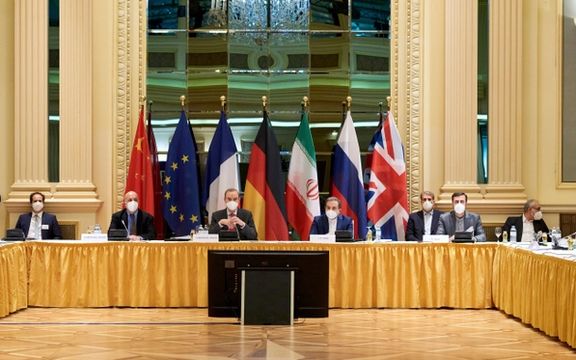
In confirming Monday their diplomats would meet in Brussels to review Iran’s stalled nuclear talks, EU foreign policy chief and Iran’s foreign ministry did not name a day.
For the European Union, Josep Borrell declined to confirm reports − citing an Iranian parliamentarian − that the meeting would be Thursday.
In Tehran, Saeed Khatibzadeh, spokesman of the foreign ministry, said that after a “constructive” visit last Thursday by Enrique Mora, the EU political director who coordinates the Vienna talks, Iran’s discussions with Europe would “continue in a few days in Brussels.”
The Vienna talks began in April but were suspended in June pending the Iranian presidential election and transition, but since then Iran has refused to return to negotiations. Aiming to restore Iran’s 2015 nuclear deal with world powers (the JCPOA, Joint Comprehensive Plan of Action), the talks failed to agree which United States sanctions needed to be lifted for Washington to return to the deal, which it left it 2018, and how Iran should bring its nuclear program back within JCPOA limits.
Neither the EU nor Iran has explained why they intend to liaise in Brussels. The Vienna talks formally involve all remaining parties to the JCPOA – China, France, Germany, Iran, Russia, and the United Kingdom – with the US taking part indirectly.
Asked about the future of the process as he arrived for an EU foreign ministers meeting in Luxembourg Monday, Borrell said he was “more optimistic today than yesterday.”
"No confirmation yet, but things are getting better and I am hopeful we will have preparatory meetings in Brussels in the days to come," he said.
New arrangement
In Tehran Khatibzadeh confirmed that the foreign ministry would continue to lead Iran’s diplomacy on the nuclear issue but with “a new arrangement.”
Asked if Ali Bagheri-Kani would take over the role as lead negotiator of Abbas Araghchi, whom he has replaced as a deputy foreign minister under President Ebrahim Raisi (Raeesi), Khatibzadeh confirmed Bagheri-Kani would lead the Iranian side in Brussels.
“Mr Bagheri will in his first opportunity present his views [opinions] to the European side,” Khatibzadeh explained.
A growing sense of urgency in European over the negotiations result results partly from concerns that the Raisi administration, which includes long-term critics of the JCPOA, will toughen Iran’s approach and partly from the experience Iran is gaining with an expanded nuclear program, which could undermine the non-proliferation calculations underpinning the 2015 agreement.
Khatibzadeh insisted that the onus in the nuclear talks lay in Washington. He also expressed Iran’s concerns over the value of any US commitments, given previous US president Donald Trump left the JCPOA unilaterally in 2018 and imposed ‘maximum pressure’ sanctions.
“All talk has been aimed at bringing back the US without preconditions to commitment to 2231,” he said, citing the United Nations Security Council resolution that endorsed the JCPOA.
“Our main goal is to make sure that all sanctions are ended and that decisions cannot be changed by anyone in Washington and there will be no games played against us. This can be achieved only in concrete talks.”
Discussions in Brussels, the spokesman said, would consider “the challenges and obstacles that were not bought to a conclusion (resolved) in Vienna.”
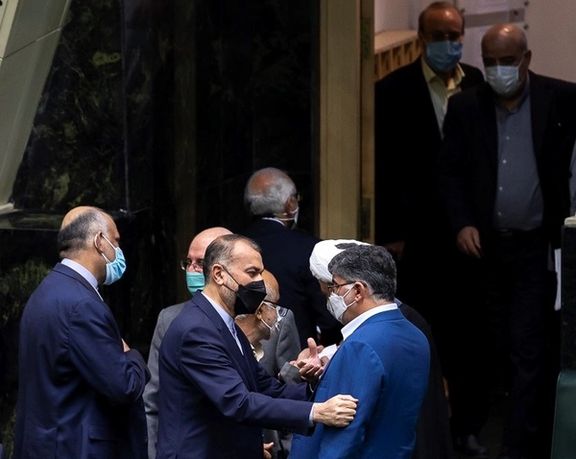
Iran's foreign minister has told a closed-door parliamentary session that Tehran expects US "goodwill" and actions before it returns to nuclear talks.
Lawmakers speaking to media after Sunday's session said Hossein Amir-Abdollahian reiterated that Iran needs to see "serious steps" by Washington before it resumes talks suspended since June.
Alireza Salimi, a leading lawmaker quoted Amir-Abdollahian as saying that Iran's policy is "action for action". Earlier this month, the foreign minister had alluded to demands that Washington should unfreeze some of Iran's blocked funds before Tehran engages in contacts with the US.
Speaking to Tasnim news agency on Sunday, Shahriar Heydari, a member of the parliament's National Security and Foreign Policy Committee, said the foreign minister also thanked Parliament for ratifying a nuclear bill in December aimed at toughening Iran's bargaining position and said this will give the other parties a clear message and enhance the power of Iran’s negotiators.
The parliament passed an act entitled "Strategic Action Plan to Counter Sanctions and Protect Rights of the People Act" in December that obliged the government to step up Iran’s nuclear program further beyond the limits set by the 2015 nuclear agreement with world powers and to reduce Iran’s cooperation with the United Nations nuclear watchdog, the International Atomic Energy Agency (IAEA).
“By the Iranian foreign minister’s own admission, the 'Strategic Action Plan' has drawn the attention of influential countries,” another lawmaker, Behruz Mohebbi, tweeted after the meeting. He added that all parties to the agreement have received "a clear and serious message" and that the government" will have a "strong tool" in its hands in the upcoming talks.
Europeans have recently raised pressure on Tehran to resume the talks. On June 20, two days after the election of Ebrahim Raisi (Raeesi) to presidency, Iran suspended the talks that began in Vienna in April and has delayed its return despite repeated promises of resuming the negotiations “soon”.
Alluding to Iran's accelerating enrichment of uranium to higher fissile purity, a possible pathway to a nuclear bomb, diplomats from Britain, Germany and France, known as the E3, said in a note on Wednesday that the situation with Iran’s nuclear activities has been worsening since negotiations stalled in June.
During a visit by Enrique Mora, European Union’s lead negotiator on Iran’s nuclear issue Thursday, Iran agreed to meet with E3 representatives in Brussels in the coming weeks. According to lawmakers, in Sunday's closed session Amir-Abdollahian said talks with E3, Russia and China, the five remaining parties to the JCPOA, will begin in Brussels on Thursday [21 October]. This in effect would be circumventing the United States if no US representative travels to Brussels to be on the sidelines of the talks, as was the case in Vienna.
After the parliament's meeting with Amir-Abdollahian Sunday, lawmaker Alireza Salimi also quoted Amir-Abdollahian as saying that the Vienna talks must begin "from the point where Trump withdrew from the JCPOA". Former US President Donald Trump withdrew from the deal in 2018 and imposed tough sanctions on Iran.
According to lawmakers Amir-Abdollahian also tried to assure parliament that Iran will not be pressured by the economic hardship prevailing in the country and will seek alternatives to help people in their daily lives. This would be no easy proposition as US sanctions have deprived Tehran of tens of billions of dollars in oil export revenues.
A report by the Plan and Budget Organization prepared in August, before Hassan Rouhani handed the administration to Ebrahim Raisi, was published Saturday that paints a very grim picture of the Iranian economy if talks fail and US sanctions are not lifted.
According to the report, if sanctions continue, in 2024 the government will face bankruptcy and the national currency will lose value tenfold. The dollar may rise to as high as 2,840,000 rials in 2027. Currently the dollar is trading at 270,000 rials.
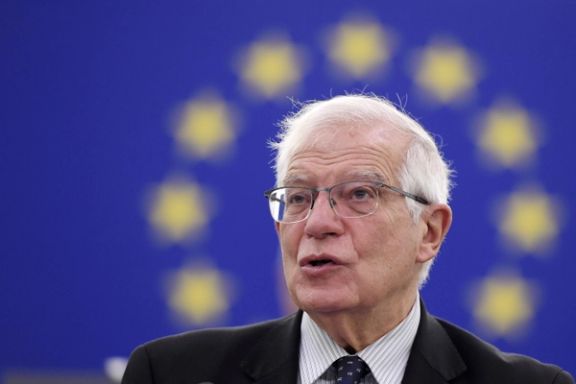
EU Foreign Policy Chief Josep Borrell said Friday that he would meet with Iranian diplomats for nuclear talks in Brussels instead of Vienna, the main venue of talks.
Enrique Mora, the EU coordinator of the Iran nuclear talks in Vienna, has failed in a visit to Tehran to agree a concrete date for resuming negotiations.
Mora met Thursday with Ali Bagheri, a new deputy foreign minister who appears to lead for Iran’s new administration on the nuclear issue, to discuss stalled efforts to revive Iran’s 2015 nuclear deal with world powers, the JCPOA (Joint Comprehensive Plan of Action).
The Iranian foreign ministry after the meeting said in a statement there had been agreement to continue dialogue in Brussels in coming days.
Borrell said that Iran wants to meet in Brussels with EU officials who are coordinating indirect talks between the United States and Iran along with some other parties to the 2015 nuclear deal.
There was no mention of a US presence if a meeting takes place in brussels, which would mean that Iran in effect stops the process of indirect talks with the Biden Administration.
Borrell told reporters in Washington that he was ready to meet the Iranians, but could not say when that might happen.
"I am ready to receive them, if needed," Borrell said, adding that he did not think talks in Brussels were absolutely necessary but that he had to be willing to be somewhat "patient on this issue, because we cannot afford to fail."
Not yet ready
An EU official said that while Tehran was “not yet ready for engaging in Vienna” it was “absolutely decided to go back to Vienna…They insisted they want practical talks…with a final agreement on how to bring the JCPOA back to life.”
The Vienna talks were suspended in June for Iran’s presidential election and transition to the administration of President Ebrahim Raisi (Raeesi). Tehran has insisted it needs time to review the process.
Signaling growing impatience in Europe, a French foreign ministry spokesman said Friday Iran needed to show by action its willingness to resume talks.With European Union foreign policy chief Josep Borrell in Washington for soundings, his spokesman Peter Stano said Thursday: “We are awaiting the Iranians' response…There is an urgent need to resume discussions very soon."
“If Iran demands more or offers less, these negotiations will not succeed," US Press Secretary Jen Psaki said in her Thursday briefing, adding that she was not going to "get into hypotheticals.”
Washington takes part in the Vienna talks only indirectly, although removing US sanctions are Iran’s key demand. President Joe Biden has continued ‘maximum pressure’ sanctions against Iran despite his campaign pledge to return to JCPOA, from which President Donald Trump withdrew the US in 2018.
Good-will gesture
Iran’s foreign minister Hossein Amir-Abdollahian last week said he had suggested to the US that they release $10 billion of Tehran’s blocked funds as a good-will gesture. There have also been reports that Iran wants guarantees the US would not again leave any agreement and re-impose sanctions.
In a tweet Mikhail Ulyanov, Russia’s envoy in Vienna, said that Amir-Abdollahian and Russian foreign minister Sergei Lavrov had reaffirmed in a phone call Thursday that restoring the JCPOA "in initial configuration" was the only way to “ensure all parties' rights and interests." Moscow is committed to the original logic of the JCPOA as a non-proliferation agreement and has distanced itself from reports that the US wants to include defense and security issues in the talks.
In another tweet, reacting to remarks from Mora Thursday, Ulyanov stressed Moscow’s shared position with the Europe while noting Russia saw "no reason for pessimism."
Other options
On Wednesday, US Secretary of State Antony Blinken and his British, French and German counterparts all described Mora’s trip as critical in bringing Iran back to the table. Blinken said the US would look to “other options” if Iran refused to cut its nuclear program back to JCPOA limits, which Tehran began to exceed in 2019 in response to US ‘maximum pressure’ sanctions.
In an interview Tuesday Rob Malley, the US special envoy on Iran, said Washington wanted to “get back to the JCPOA to calm things down,” but there has also been wide media coverage of US-Israel consultation, with former Mossad chief Yossi Cohen stressing Israel’s option of bombing Iran’s nuclear sites.
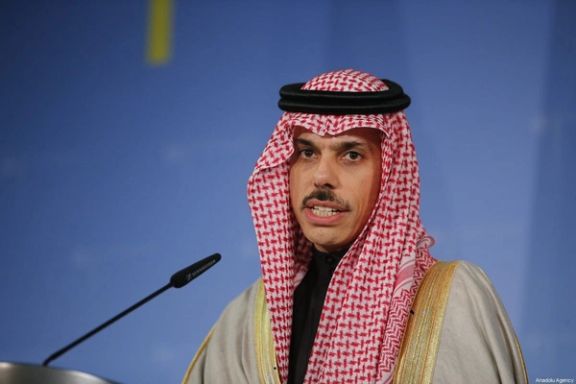
Saudi Arabian Foreign Minister Prince Faisal bin Farhan said on Friday that Iran was accelerating its nuclear activities and putting the region in “a very dangerous place”.
Diplomatic efforts since April to bring Tehran back into the 2015 nuclear deal have not succeeded as Iran continues enriching uranium and getting closer to the threshold of having enough fissile material for a bomb.
Israeli, Saudi and Emirati top officials in Washington this week discussed the stalled Iran nuclear negotiations with top US officials. The US regional allies have been concerned over the Biden Administration’s plans to revive the 2015 nuclear deal (JCPOA), which they think is inadequate to address their concerns over Iran’s policies.
In an interview with the Financial Times earlier bin Farahan said bilateral talks between Riyadh and Tehran have been “cordial” and “exploratory”, adding that Saudi Arabia has a serious approach to the negotiations, but they have not made substantial progress and to reach a stage for normalization of relations.
Riyadh severed ties with Tehran after rioters ransacked its diplomatic mission in Iran in January 2016.
Bin Farhan gave a wide-ranging news conference in Washington on regional developments during his visit to the United States.